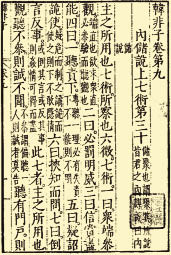| Han Fei's Art of Rulership: Governing a State by Power, Law and
Statecraft
By WEN HAIMING
HAN Fei (ca. 280-233 BC) was born into the ruling family of the State of Han (in present-day Henan Province). He differed from other philosophers of his time in that his noble status came with certain responsibilities and fated him to have to master the art of governance.
Han Fei was a student of Xunzi (ca. 313-238 BC), one of three archetypal Confucian philosophers of the pre-Qin era. Han Fei had a bad stutter, a serious impediment at a time when rhetorical eloquence was a potent political weapon in the arsenal of a statesman. But he was good at writing and it was through his wonderful articles that his brilliance was displayed.
It was said that Qinshihuang, the king of Qin who later united China, appreciated Han Fei’s ideas and arguments very much and was so eager to meet the author that he launched an attack to the State of Han. After finding out that Han Fei was the cause of this war, the king of Han decided to hand him over to the Qin emperor. However, the king of Qin had a powerful minister, Li Si (ca. 280- 208 B.C.), who was also a student of Xunzi and a jealous rival of Han Fei. To ruin Han Fei, Li Si told the king of Qin that because Han Fei was in fact a prince of the royal family of Han, he would always remain loyal to his home state and never serve the Qin well.
Without being given a chance to explain, Han Fei was jailed and driven to suicide by poison. When the Qin emperor finally came to regret his decision it was already too late for the great philosopher.
 |
| Han Fei’s collected works, Han Fei Zi.
China Foto Press |
Legalism
Han Fei was a representative of the legalist school of his time, which was a utilitarian political philosophy. A classic legalist work was Shang Jun Shu, or Book of Lord Shang by Shang Yang, an important statesman of the State of Qin. The teachings of the school can be boiled down to strengthening the power and effectiveness of a ruler – in today’s terms, the questions of political science. The aims of legalist thinkers are similar: to preserve the state’s viability. It is evident that legalism was essential to developing the art of organizing a state and mobilizing a strong army in chaotic times like the Warring States Period. The State of Qin, after heeding the advice of generations of legalist thinkers, finally became the superpower of its time, annexed its neighbors, and united China.
Like Machiavelli’s famous The Prince, Hai Fei’s writings were also a handbook for rulers and those who would master governance, elaborating on tactics ranging from controlling officials to maintaining the support and awe of the people. Han Fei disdained the Confucian glorification of the golden sage-king days of antediluvian times, but advocated reviewing history both for the purposes of planning the future and acting on pragmatic, immediate concerns.
In the Five Vermin Chapter of his collected works Han Fei Zi, he told this famous story. Once there was a farmer in the state of Song who while tilling his field one day, saw a hare speed by him, ram into a tree, and die. Impressed by this windfall of a free meal, the man took to neglecting his farm work and instead squatted by the tree everyday waiting for more hares to commit suicide in front of him. But none ever came by. The story points out the folly of waiting for unearned gains by trusting in chance and luck. Likewise today’s rulers should not govern the people with the methods of yesterday’s kings, but rather be flexible and renew their honors and achievements with hard work.
| 